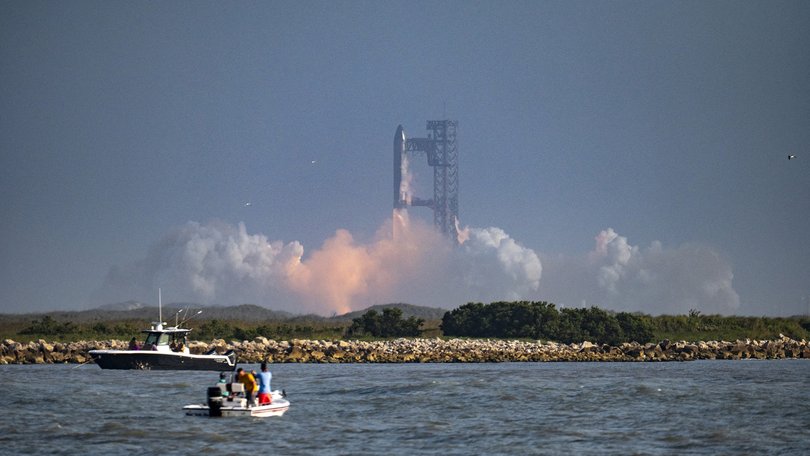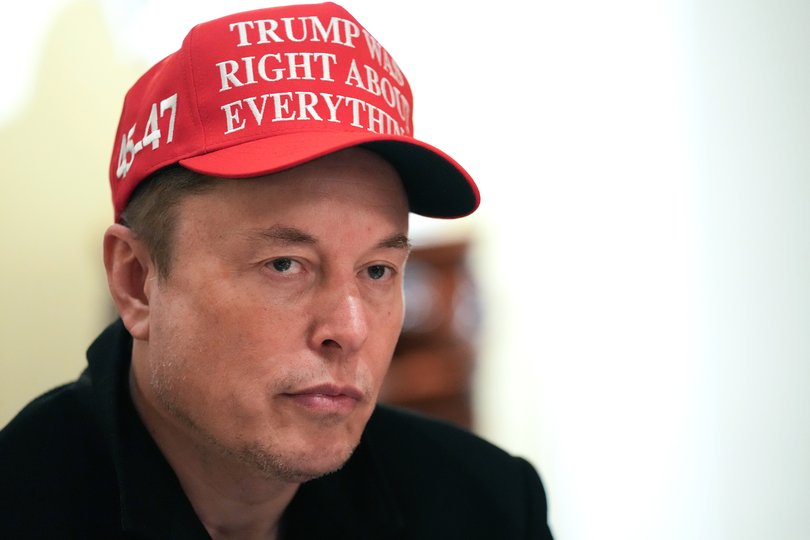SpaceX’s failed test proves Elon Musk needs to refocus on business
The negative impact of the billionaire’s absence and foray into politics is even clearer at his space start-up than it is at Tesla.

Another Starship glitch is not a good look for SpaceX, the startup founded by Elon Musk.
This is the third consecutive Starship launch that ended with disappointment and several uncompleted tests. The mantra of SpaceX’s tests have been to fail, learn and iterate. This strategy hasn’t worked as well without full attention from Musk, who converted the idea of building a reusable rocket into reality.
The world knows that Musk had been immersed since the beginning of the year in creating the Department of Government Efficiency and cutting costs in Washington and didn’t give his full attention to fixing problems after the explosions of Starship spacecraft in January and March.
Sign up to The Nightly's newsletters.
Get the first look at the digital newspaper, curated daily stories and breaking headlines delivered to your inbox.
By continuing you agree to our Terms and Privacy Policy.His promise to return as a full-time businessman focused on SpaceX, Tesla Inc. and his other activities was long overdue.
Musk’s leap into the deep end of partisan politics certainly hurt the Tesla brand. Sales have plummeted in Europe, and Tesla vehicles became the targets of vandals in the US. It’s much more difficult to understand the impact Musk’s absence had on Tesla’s engineering and manufacturing operations.
That negative impact is clearer at SpaceX, the venture Musk created to fulfill his dream of putting humans on Mars and, more important, a key company for the US to stay ahead of rivals in a new space race. Musk is more than just a serial entrepreneur.

He has a knack for making operations work on production of some of the most difficult hardware: electric vehicles and space rockets.
The benefit of his return to business would be even greater if Musk were to realise that the hyper-partisan and public stances he takes don’t move the needle much for improving the nation, but they definitely hurt his companies.
Tesla is about to shift gears to build robots that Musk wants to sell to consumers, and SpaceX’s satellite internet unit, Starlink, is now negotiating with nations to offer the service to customers.
Unlike the other two Starship mishaps this year, this time the separation from the first-stage Super Heavy rocket went well. Then a lot of things went wrong.
The payload doors failed to open on the spacecraft, which was supposed to deploy simulated satellites.
There was a propellant leak, and the spacecraft began to spin out of control. Meanwhile, the Super Heavy booster, which was reused from an earlier flight for the first time, suffered a malfunction and exploded, voiding tests that were supposed to take place during a landing into the ocean.
This was a high-stakes test for Starship, and SpaceX faltered. Musk cancelled a webcast talk he was scheduled to give to SpaceX employees on Tuesday and instead conveyed his optimism in a post on his social media network X that promised an increased cadence for test flights.
Although SpaceX has turned the space industry on its head by reducing drastically the costs of launches with its smaller Falcon 9 reusable rocket, the company is still in startup mode with Starship.
In a testament to Musk’s operational chops, the Falcon 9 has completed 478 missions, and 403 of those were done with a reusable first stage, which the company captures after flight. SpaceX makes everything from rocket engines to the satellites that it deploys to build out Starlink, which has a network of more than 7,000 low-earth orbit satellites, putting it way ahead of any competition.
It was Musk who defied an auto industry to start an electric vehicle production company while legacy automakers failed to make money building battery-powered cars.
Tesla pulled it off with innovative manufacturing techniques that proved Musk’s abilities to make things. While Tesla and SpaceX count on software and automation, these companies make physical products akin to Apple Corp. and Nvidia Corp.
This requires engineering and manufacturing skills that are very distinct from Microsoft Corp, Alphabet Inc or even Amazon.com Inc, which don’t make hardware.
For investors, the best-case scenario is a visionary chief executive officer who is focused on the business at hand, not politics. Being apolitical is particularly important if the product is sold to consumers who have a choice. Target Corp and Anheuser-Busch InBev SA/NV have both paid the price for crossing the line on political issues that rile up customers.
In the case of Tesla, Musk’s shift in politics from left-of-center to right-of-Trump has been dismaying and dizzying for his original fan base, who are people with heightened concerned about carbon emissions and more disposed to purchase an EV.
SpaceX has even bigger reasons to keep politics out of its business.
The company relies on Government contracts with NASA and the Defence Department. Both agencies at this point need SpaceX and the lower launch costs it offers, but eventually competition will catch up. Space exploration and space defence are bipartisan and should remain so.
It’s also in the US interest that other nations allow Starlink to offer its internet service to customers.
With Musk’s political stances, it’s not hard to think of this effort as a Trump push to help a friend.
Instead, it should be a goal that benefits the US - similar to how both sides of the political aisle want Boeing to sell more planes abroad.
Starlink’s service provides internet access to rural populations and the freedom that comes from having information at your fingertips. Satellite internet is a service that at some point China will offer to the world.
It’s unlikely that Musk will suddenly turn off his political comments. Still, investors should encourage him to tone it down. It’s a good start that he has decided to leave Washington and focus on his businesses.
Perhaps the results will show up in the next test-launch of Starship.
